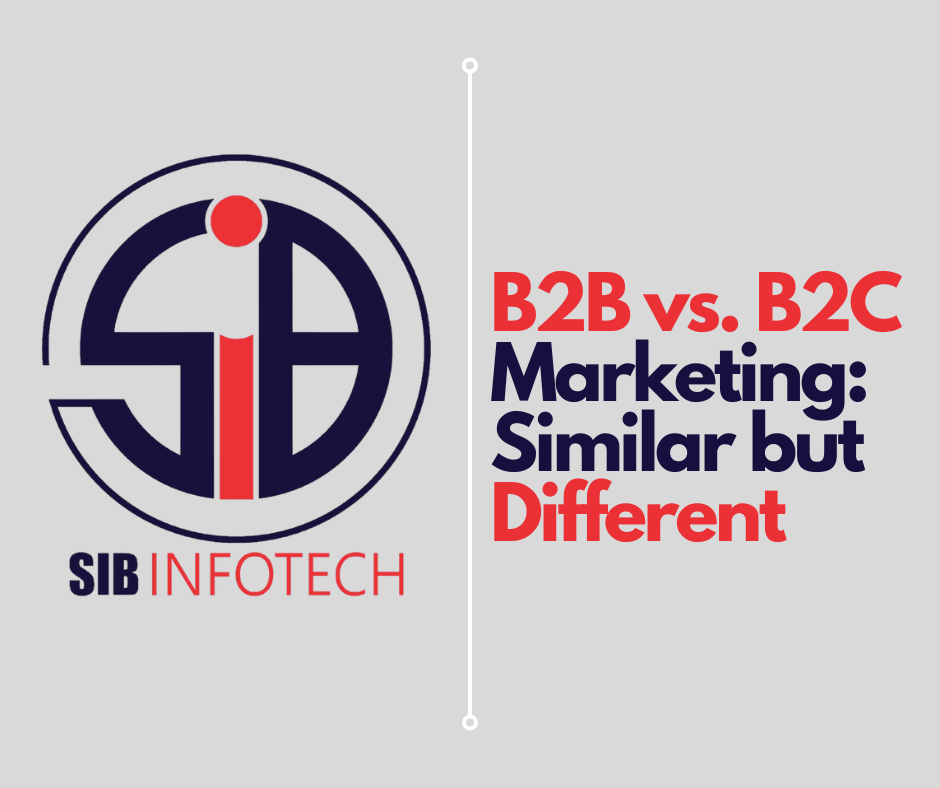In the fast-paced digital world, businesses must leverage strategic marketing to stay ahead. Whether targeting businesses (B2B) or consumers (B2C), marketing plays a crucial role in customer engagement, brand positioning, and revenue generation. However, while these two marketing approaches share common elements, they differ significantly in execution, audience psychology, and sales cycles.
If you are a business owner or marketer, understanding these key differences is critical for optimizing your strategy and achieving maximum ROI. This article will explore the core distinctions between B2B and B2C marketing, their unique challenges, and how businesses can refine their marketing efforts for sustainable growth.
- Understanding the Core Differences
At first glance, B2B (Business-to-Business) and B2C (Business-to-Consumer) marketing may appear similar. Both require a clear value proposition, competitive positioning, and customer-centric approaches. However, the fundamental difference lies in the target audience.
- B2B marketing targets businesses, corporations, or professionals who need products or services to optimize their operations.
- B2C marketing focuses on individual consumers who make purchasing decisions based on personal needs, desires, or emotions.
- Target Audience and Decision-Making Process
The decision-making process varies greatly between B2B and B2C customers.
B2B: Logic and ROI-Driven Decisions
- B2B buyers are professionals, executives, or procurement teams looking for efficiency, profitability, and long-term value.
- Decisions are data-driven, requiring in-depth research, case studies, and ROI analysis.
- The buying cycle is longer and often involves multiple stakeholders.
B2C: Emotion-Driven Purchases
- Consumers make purchases based on personal desires, emotions, and immediate needs.
- Decision-making is faster and often influenced by advertising, social proof, and branding.
- Customers expect an engaging, personalized, and seamless buying experience.
- Marketing Strategies for B2B vs. B2C
B2B Marketing Strategies: Building Trust & Authority
To successfully reach B2B buyers, businesses must establish credibility and demonstrate value. Key strategies include:
- Content Marketing: Whitepapers, case studies, and research reports help educate and influence decision-makers.
- SEO & Thought Leadership: High-ranking blog content, LinkedIn presence, and industry-specific SEO attract relevant leads.
- Email Marketing & Automation: Personalized email campaigns nurture leads throughout the sales funnel.
- Account-Based Marketing (ABM): Highly targeted campaigns designed for specific companies or industry segments.
B2C Marketing Strategies: Engaging & Persuading Consumers
For B2C brands, marketing must create strong emotional connections. Effective tactics include:
- Social Media Marketing: Instagram, Facebook, and TikTok campaigns capture attention and drive engagement.
- Influencer & User-Generated Content: Collaborations with influencers and real customer testimonials build trust.
- Paid Ads & Retargeting: Google Ads, Facebook Ads, and remarketing campaigns keep brands top-of-mind.
- Personalization & Customer Experience: AI-driven recommendations and loyalty programs enhance customer satisfaction.
- The Role of Customer Relationships
Customer relationships differ between B2B and B2C marketing.
- B2B relationships are long-term, focusing on trust, repeat business, and personalized service. Customer support, dedicated account managers, and industry expertise play a vital role.
- B2C relationships are often transactional but rely on brand loyalty, emotional engagement, and seamless experiences. Excellent customer service and personalization enhance retention.
- Sales Cycles: Longer vs. Shorter
- B2B Sales Cycle: Longer, requires multiple touchpoints, relationship-building, and approvals from decision-makers.
- B2C Sales Cycle: Shorter, impulse-driven, and heavily influenced by marketing campaigns.
- Challenges and How to Overcome Them
B2B Marketing Challenges
- Longer sales cycles: Use automation and lead nurturing to keep prospects engaged.
- Complex decision-making: Provide clear data, case studies, and detailed insights.
- Brand differentiation: Leverage thought leadership and unique value propositions.
B2C Marketing Challenges
- High competition: Create compelling brand storytelling and customer engagement.
- Customer retention: Implement loyalty programs and excellent customer service.
- Ad fatigue: Continuously innovate content and advertising strategies.
- Final Thoughts: Which Marketing Approach Is Right for You?
Both B2B and B2C marketing require well-planned strategies, but understanding their differences is crucial for success.
- If your target audience consists of businesses, focus on expertise, value-driven content, and long-term relationships.
- If you’re marketing to consumers, prioritize emotional appeal, user engagement, and seamless experiences.
In today’s competitive digital landscape, mastering both approaches can set you apart and drive success. Are you ready to optimize your marketing strategy? Start implementing these insights today to gain a competitive edge.
Why Choose SIB Infotech for Your Marketing Needs?
SIB Infotech is a powerhouse of highly skilled professionals, providing state-of-the-art web solutions tailored for both B2B and B2C businesses. From high-ranking SEO strategies to conversion-driven content marketing, our expertise ensures measurable results.
Let’s transform your business with the best marketing strategies. Contact SIB Infotech today!

